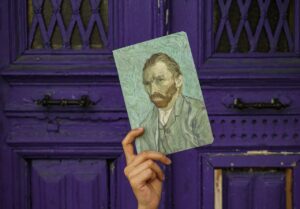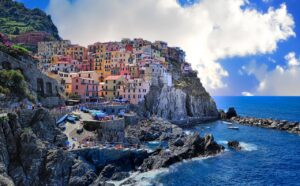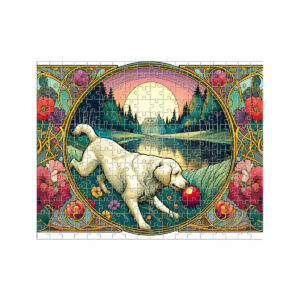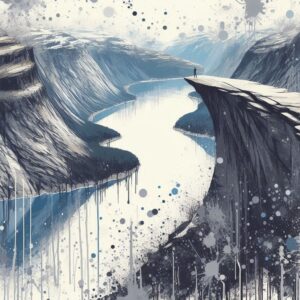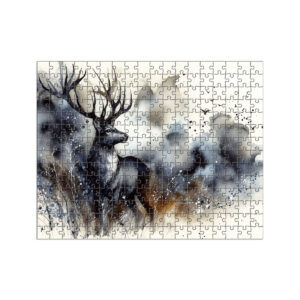
Explore & Play
Discover interesting topics and solve the accompanying crossword puzzle.
Author Crossword | 50 Literary Giants
Table of Contents
Welcome to our literary adventure! Start by challenging yourself with our Author crossword puzzle to test your knowledge of famous writers. If you’re new to the topic or want to dive deeper into the world of these iconic authors, feel free to read through the article first and return to the crossword for a fun review. Enjoy exploring the lives and works of 50 literary giants!
Author Crossword
You can either fill in the crossword puzzle directly on this page or click the button in the bottom right corner to print it for free.

A Journey Through Literary Giants: Exploring the Lives and Works of Iconic Authors
Embark on a literary adventure as we explore the lives and works of 50 iconic authors who have shaped the world of literature with their remarkable contributions. This journey will not only highlight their achievements but also provide insight into how their stories and styles have influenced generations of readers.
The Golden Age of Classic Literature
William Shakespeare: The Bard of Avon
William Shakespeare, often hailed as the greatest playwright of all time, has left an indelible mark with his timeless plays and sonnets. His works, such as “Hamlet,” “Macbeth,” and “Romeo and Juliet,” are celebrated for their profound exploration of human nature and universal themes. Shakespeare’s influence extends beyond literature into theater, film, and even everyday language.
Jane Austen: Master of Romance and Social Commentary
Jane Austen’s keen observations of social dynamics and romantic entanglements continue to captivate readers with her nuanced portrayals. Her novels, including “Pride and Prejudice” and “Sense and Sensibility,” offer sharp critiques of the social structures of her time while delivering memorable love stories. Austen’s wit and intelligence shine through her character-driven narratives, making her a beloved figure in literature.
Charles Dickens: Chronicler of Victorian Society
Charles Dickens’s vivid storytelling and social critiques offer a window into the complexities of 19th-century England. With works like “A Tale of Two Cities” and “Great Expectations,” Dickens captured the struggles of the poor and the injustices of society. His elaborate characters and intricate plots continue to resonate, showcasing his ability to blend social commentary with compelling narratives.
The Influence of American Literature
Mark Twain: The Voice of American Humor
Mark Twain’s wit and satire shine through in his adventurous tales, offering both humor and critical insights into American society. Twain’s novels, including “The Adventures of Huckleberry Finn,” address themes of race, morality, and freedom, all while providing readers with a captivating and humorous perspective on American life.
Ernest Hemingway: The Master of Modern Prose
Ernest Hemingway’s distinctive writing style and exploration of human resilience have cemented his status as a literary icon. Known for his succinct prose and themes of heroism and existential struggle, Hemingway’s works like “The Old Man and the Sea” and “For Whom the Bell Tolls” continue to be revered for their profound emotional depth and narrative power.
F. Scott Fitzgerald: The Chronicler of the Jazz Age
F. Scott Fitzgerald’s exploration of wealth and decadence in the Roaring Twenties is epitomized in his celebrated work, “The Great Gatsby.” Fitzgerald’s depiction of the American Dream and its discontents captures the spirit of an era while offering a critical view of its superficiality. His elegant prose and evocative storytelling have made “The Great Gatsby” a staple of American literature.
Exploring International Literary Masters
Leo Tolstoy: Russian Epic Storyteller
Leo Tolstoy’s epic novels, such as “War and Peace,” offer profound reflections on the human condition and historical upheavals. Tolstoy’s intricate narratives and philosophical inquiries into life, faith, and morality have established him as a towering figure in Russian literature, whose works continue to influence and inspire.
Gabriel García Márquez: The Father of Magical Realism
Gabriel García Márquez’s enchanting narrative style brings magical realism to life, most famously in his masterpiece “One Hundred Years of Solitude.” Márquez’s innovative blend of the fantastical with the ordinary revolutionized Latin American literature and has captivated readers worldwide with its imaginative storytelling.
J.K. Rowling: The Modern Fantasy Phenomenon
J.K. Rowling’s creation of the “Harry Potter” series has transformed modern fantasy literature and captivated millions of readers worldwide. Through her richly imagined world of wizards and magical creatures, Rowling has not only created a global phenomenon but also addressed themes of bravery, friendship, and self-discovery.
Contemporary Voices and Their Innovations
Stephen King: The King of Horror
Stephen King’s prolific output and mastery of the horror genre have made him a leading figure in contemporary literature. King’s novels, such as “The Shining” and “It,” blend supernatural elements with psychological depth, creating chilling and memorable narratives that have become staples of modern horror.
Margaret Atwood: Visionary of Dystopian Futures
Margaret Atwood’s exploration of dystopian themes in works like “The Handmaid’s Tale” continues to provoke thought and discussion. Atwood’s incisive storytelling and keen observations on gender, power, and society have established her as a crucial voice in contemporary literature, especially in exploring speculative and feminist themes.
Salman Rushdie: The Magic of Postcolonial Narratives
Salman Rushdie’s imaginative storytelling and exploration of postcolonial themes offer a rich tapestry of narrative complexity. Works like “Midnight’s Children” showcase Rushdie’s ability to blend history, fantasy, and political commentary, making him a significant figure in both literary and cultural discourse.
The Enduring Legacy of Literary Classics
Herman Melville: The Tale of the Great White Whale
Herman Melville’s “Moby-Dick” remains a profound exploration of obsession and the human spirit. Melville’s complex narrative and philosophical depth have cemented “Moby-Dick” as a classic work that challenges readers to ponder the nature of good and evil, as well as the limits of human ambition.
Edgar Allan Poe: Master of Gothic Horror
Edgar Allan Poe’s chilling tales and poems have solidified his reputation as a pioneer of Gothic horror. With works like “The Raven” and “The Tell-Tale Heart,” Poe’s innovative use of dark themes and psychological horror continues to captivate readers and influence the genre.
Oscar Wilde: The Wit and Satire of a Literary Genius
Oscar Wilde’s sharp wit and satirical plays challenge societal norms and entertain readers with their clever commentary. Wilde’s works, including “The Picture of Dorian Gray” and “The Importance of Being Earnest,” offer incisive critiques of Victorian society while showcasing his flair for dazzling prose and satire.
Diverse and Influential Modern Authors
Toni Morrison: Celebrator of African American Experiences
Toni Morrison’s exploration of African American life and history in novels like “Beloved” offers powerful insights and emotional depth. Morrison’s ability to capture the complexities of race, identity, and memory has earned her a lasting place in the literary canon and continues to resonate with readers.
Kazuo Ishiguro: Master of Memory and Identity
Kazuo Ishiguro’s poignant exploration of memory and identity in works such as “Never Let Me Go” continues to resonate with readers. Ishiguro’s innovative storytelling and profound questions about human experience have established him as a significant contemporary voice in literature.
Zadie Smith: Chronicler of Contemporary Life
Zadie Smith’s vibrant narratives and keen observations of contemporary society reflect her skill in capturing the essence of modern life. With novels like “White Teeth” and “Swing Time,” Smith offers insightful portrayals of multiculturalism and social dynamics in today’s world.
Authors Who Shaped the Genre
Ray Bradbury: Visionary of Science Fiction
Ray Bradbury’s imaginative works, particularly “Fahrenheit 451,” have significantly shaped the science fiction genre. Bradbury’s exploration of censorship, technology, and the power of literature remains highly relevant and influential in both literary and cultural contexts.
Kurt Vonnegut: Satirist of Modern Society
Kurt Vonnegut’s satirical and thought-provoking novels, such as “Slaughterhouse-Five,” offer unique perspectives on the absurdities of modern life. Vonnegut’s blend of dark humor and social commentary has made him a distinctive voice in contemporary literature.
Philip Roth: Chronicler of American Jewish Identity
Philip Roth’s exploration of American Jewish identity and existential themes has made a lasting impact on contemporary literature. His novels, including “Portnoy’s Complaint” and “American Pastoral,” provide insightful and often provocative examinations of personal and cultural identity.
Reflecting on Literary Legends
As we conclude our journey through the lives and works of these 50 iconic authors, we reflect on their enduring legacies and the rich tapestry of literature they have woven. Their stories, characters, and insights continue to inspire and influence readers around the world.
Ready to put your literary knowledge to the test? Play our crossword puzzle and see how many of these legendary authors you can identify!
Share to...
I hope you enjoy the content.
Want to receive our daily crossword puzzle or article? Subscribe!
You may also be interested in
Share to…
Want to receive our daily crossword puzzle?
-
Jigsaw Puzzles
Art Nouveau Jigsaw Puzzle with Playful Dog in Scenic Landscape 250 | 300 | 500 Pieces
kr 348,00 – kr 439,00 Select options This product has multiple variants. The options may be chosen on the product page -
Jigsaw Puzzles
Trolltunga Abstract Jigsaw Puzzle 250 | 300 | 500 Pieces
kr 348,00 – kr 439,00 Select options This product has multiple variants. The options may be chosen on the product page -
Jigsaw Puzzles
Majestic Stag Watercolor Jigsaw Puzzle 250 | 300 | 500 Pieces
kr 348,00 – kr 439,00 Select options This product has multiple variants. The options may be chosen on the product page
